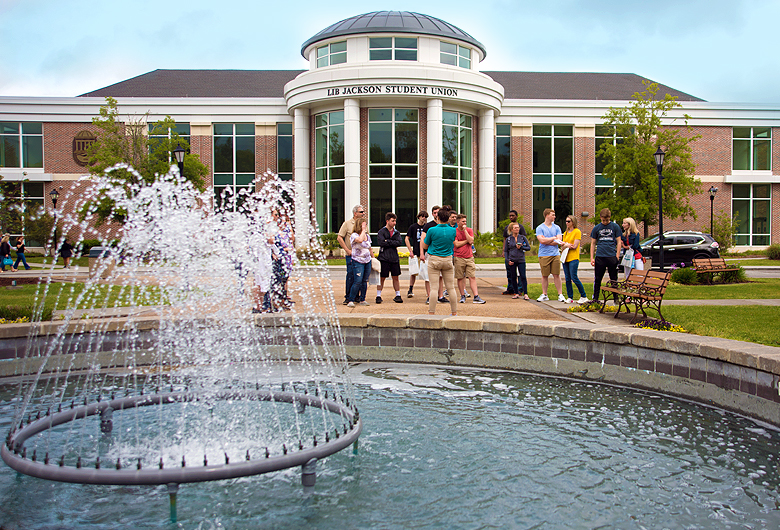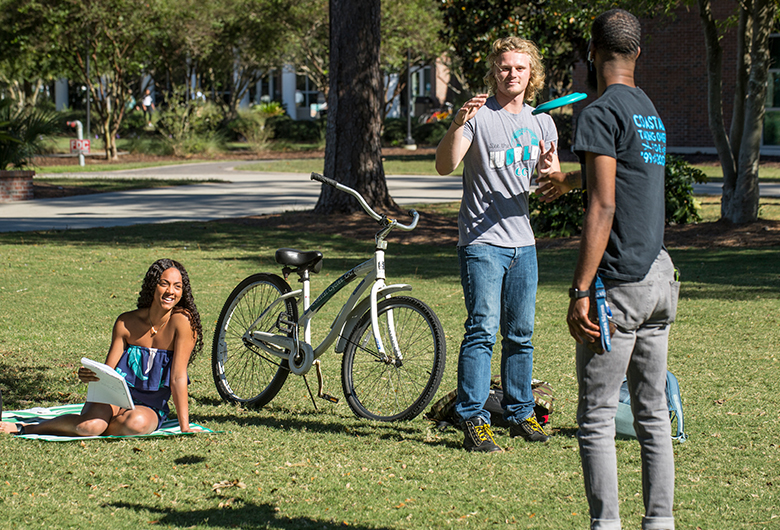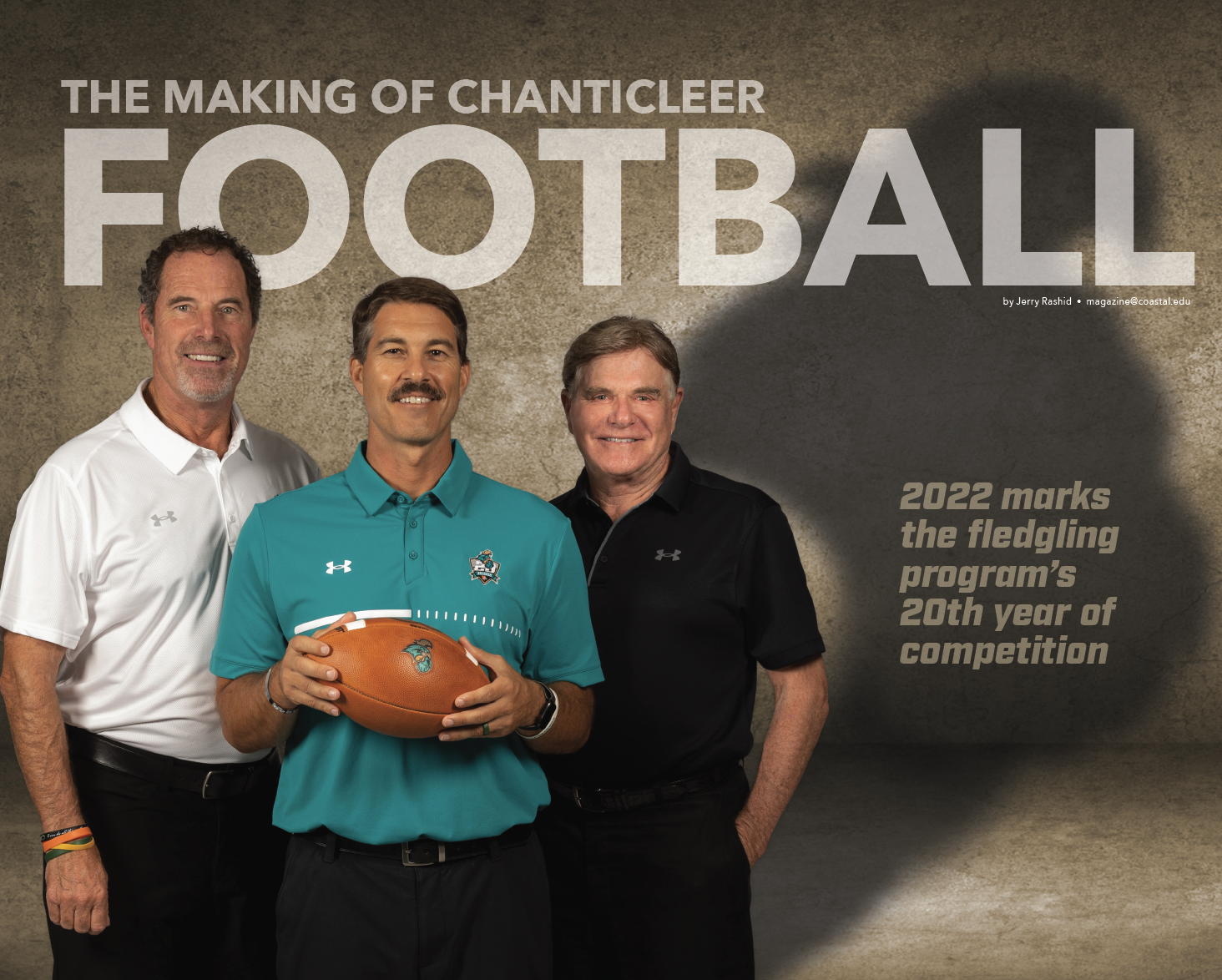
In good hands: The program’s only three head coaches - David Bennett, Jamey Chadwell, and Joe Moglia.
by Jerry Rashid • magazine@coastal.edu
The Chanticleer football program’s two-decade rise can be likened to an all-out blitz and quarterback sack on fourth and goal – swift, impressive, and a game-changer.
With endorsement by the Coastal Carolina University board of trustees, the long-awaited dream of adding football at the University took place on Nov. 10, 1999. That’s when then-President Ronald R. Ingle stepped up to the podium in front of a packed house at Wheelwright Auditorium to make the historic announcement.
“This is a great day for Coastal Carolina University,” said Ingle. “I am pleased to announce that Coastal is officially pursuing the addition of football to our University intercollegiate athletic program.”
That statement set in motion an impressive whirlwind of activity to help establish the program that has had an immeasurable impact on the University. It included the introduction of a six-person Football Advisory Committee, chaired by Buddy Sasser, who served two stints as CCU’s athletic director and was a former commissioner of the Big South Conference; the hiring of Cheraw, S.C., native David Bennett, who was charged with the daunting task of building an NCAA I-AA program from the ground up; the program’s first-ever recruiting class, which featured the likes of Maurice Simpkins ’06, Quinton Teal ’07, and Tyler Thigpen ’06, all of whom extended their playing careers into the National Football League (NFL); and the July 30, 2002, groundbreaking ceremony for Brooks Stadium, supported by former Loris native Bob Brooks, who, along with his wife, Tami, made a multimillion-dollar donation to help bring the facility to fruition.
All of those pieces were put into place in anticipation of the program’s inaugural game on Sept. 6, 2003. A raucous crowd of 7,948 filled Brooks Stadium to be a part of the historic moment, which resulted in the Chanticleers defeating Newberry College by a score of 21-14. The game was decided when Eshoun Talley ’06 capped a 97-yard drive, all running plays, with his nine-yard touchdown run with just seven seconds left on the game clock.

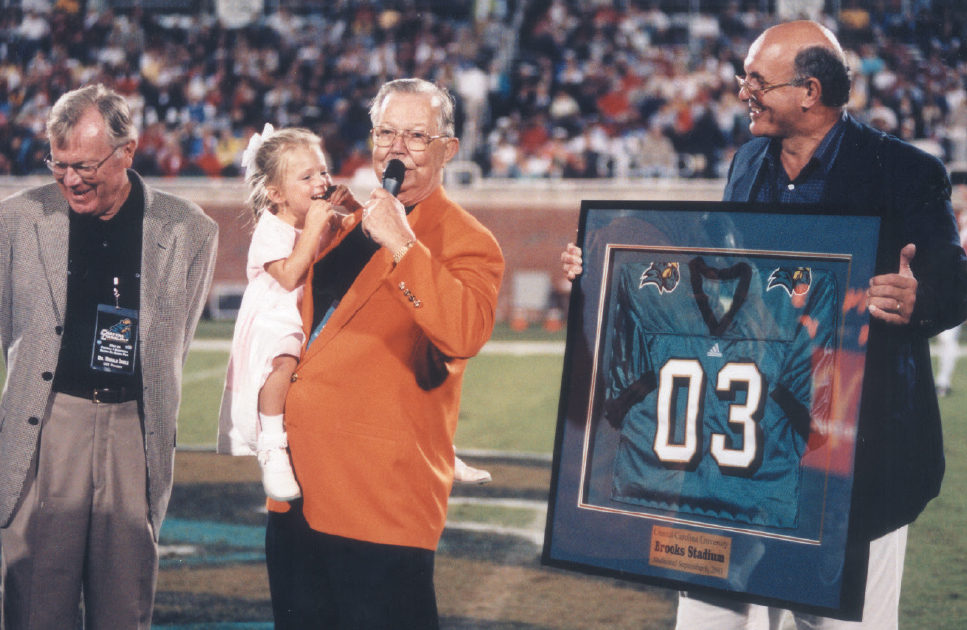
Aerial view of Brooks Stadium during the Chanticleers’ first-ever game on Sept. 6, 2003. Benefactor Bob Brooks, with daughter Boni Belle, was given a commemorative jersey during the game by CCU President Ron Ingle (left) and Director of Athletics Warren “Moose” Koegel.
During the two decades since that milestone contest, Chanticleer football strategically moved up from the NCAA Division I-AA (now known as Football Championship Subdivision – FCS) level and to the NCAA Division I Football Bowl Subdivision (FBS) level – the highest in intercollegiate athletics. The rapid, successful evolution of the program has resulted in games that are now regularly shown in primetime on ESPN. The program’s rise, which includes back-to-back 11-win seasons in 2020 and 2021 and a 2020 Sun Belt Conference title, was punctuated by the school’s first-ever bowl game victory (2021) in just its second appearance.
Michael T. Benson, who was named CCU’s third president in October 2020 and assumed the role on Jan. 1, 2021, is well aware of the positive impact of Chanticleer football.
“I came to Coastal, to use a sports metaphor, in the fourth quarter – as the University, in many ways, was cresting in terms of the national exposure brought to campus by the football program,” said Benson. “The 2020 season was unlike anything we had experienced before. It was a magical year.
“People talk about our national championship baseball run in 2016 and the 2020 football season with the same fervor and the same excitement. Some people look somewhat skeptically at the correlation between exposure on TV for a sports program, like we had in 2020, and enrollment. But the fact of the matter is, national enrollment at four-year universities was down almost 4% from 2020 to 2021. We were up more than 3%, so that is a 7% swing in our favor. You can’t deny that people know about Coastal Carolina University. It’s a national brand now.”
Chanticleer football has been two decades in the making. Much of what has been accomplished can be attributed to a host of individuals: trustees, presidents, administrators, coaches, student-athletes, staff, donors, and community members. But it’s hard to imagine where the program would be without the commitment and tireless efforts of the program’s only three head coaches: Bennett, Joe Moglia, and Jamey Chadwell.
“Our three head coaches have brought different skill sets and experiences to the program that have been just what we needed,” said Benson. “Coach Bennett laid the program’s foundation, Coach Moglia built upon that foundation, and Coach Chadwell has taken it to the next level.”


The Vision
Ingle was at the helm of the institution from 1992-2007, which entailed overseeing its transition from a 33-year affiliation as a University of South Carolina regional campus to an independent state university in 1993. At the time, in addition to signature academic programs such as marine science, he was looking for something that would help give the young school a stronger identity.
“There is nothing in the South that will give you more exposure in Sunday morning papers than football,” said Ingle. “I knew the closest program to us was at least two hours away. I felt we could sell season tickets because this region of South Carolina is a sports-loving area.”
Ingle envisioned Chanticleer football as a family-friendly activity, creating traditions through tailgates and the sharing of gameday food and stories.
The program’s establishment coincided with the hiring of Warren “Moose” Koegel as the Chants’ athletic director. He served from 2001-10 and played a key role in the overall vision and launch of the program, as well as in Bennett’s hiring. Koegel, an offensive captain who played center at Penn State University and then in the NFL with the Oakland Raiders and New York Jets, brought many years of collegiate coaching and administrative experience to the position along with a keen understanding of all things football.
“I had to develop a whole gameplan for the program,” said Koegel. “What kind of stadium we were going to build, what we were going to use for a study hall. We needed space, and we needed to upgrade our facilities. I met with architect Ron Smith with McMillan Smith & Partners. The two of us designed Brooks Stadium to be completed in stages, which is what we now see today. I had to lay out the vision of the program and then go out and hire a coach.
“My goal was to build for the future. I knew the kind of impact the football program would have on the University if we did it the right way. What I am most proud of is that it was a team effort – trustees, administrators, faculty, staff, coaches, trainers, student-athletes, cheerleaders, band members, and countless others. The success of the program now is the result of the strong foundation we established together. The football program has elevated the entire University and helped it to grow. It has also elevated all the other athletic programs.”

Coach Bennett was the visionary who laid a strong foundation for the Chanticleer football program.
When the search for program’s very first head coach began, Ingle sought the advice of longtime friend Fisher DeBerry, who, at the time, was a highly successful head football coach at the U.S. Air Force Academy. The two became good friends while attending Wofford College. DeBerry, like Bennett, called Cheraw his hometown, and he knew about the coach’s football coaching prowess. He would eventually become one of the key members of the program’s Football Advisory Committee.
Ingle recalled a pointed conversation with DeBerry about adding football at the University: “When I called him and told him what I was planning to do, he said, ‘You have lost your mind?’ I let him know that what I wanted here was a good person to lead our program. He recommended David.”
Koegel’s goal was to hire a coach with a personality that would be embraced by the Grand Strand and who could go out and sell the program to the community and prospective student-athletes. Following a national search led by Koegel, who fielded numerous inquiries from around the country, Bennett was introduced as the Chants’ inaugural head coach on Dec. 21, 2001. He previously served for seven years as the head coach at Catawba College, an NCAA Division II school in Salisbury, N.C.
“David is a really good person,” said Koegel. “People like David immensely. I knew I was getting a young, energetic coach who was not afraid to work. He was ready to make the move and do it the right way.”
When Bennett and his staff hit the recruiting trail, they had little to sell to prospective student-athletes, as the program lacked the basics such as a stadium, a primary practice field, and equipment.
“Having the opportunity to start a football program within the Palmetto state was intriguing,” said Bennett. “We could start something from scratch and have a big vision to build something special.
“I remember our inaugural year [2002 was a non-competition season for the Chants’ program], we practiced on one of the intramural fields. We also went to Conway Rec; we went to the Carolina Forest High School band practice field. We even went over to a vacant driving range and practiced.
“A lot of people don’t realize that when it began, we didn’t have anything. It was neat talking with the folks at HTC, Mike Hagg and Brent Groome, about getting cell phones for the coaches, not only football coaches, but all of our coaches. We secured cars for the athletic department. Bruce Stewart [former senior associate athletic director] and I went out and did that. We were trying to make Coastal more of a big-time athletic program.
“There were a couple of days when we went to practice, and I looked around that first year, we had 17 guys on scholarship and over 100 walk-ons. We looked at one another and said, ‘What in the world have we done?’ The players were sharing two and three to a locker inside that little athletic building. I remember when we got the weight room located in the shipping and receiving building, there wasn’t air conditioning in there. So, when the players were in there during the summer, it was like a hotbox. When you look back, you think, ‘Where is this going to go?’”


The Chanticleers lined up at Clemson on Oct. 31, 2009. Coach Bennett hoists the 2004 Big South Conference championship trophy.
With recruiting well underway, Ingle began developing a strong relationship with Brooks, a highly successful businessman who was a graduate and major benefactor of Clemson University.
“Although he didn’t have a connection with the school, he was aware of what we were doing, and how we were growing and doing things the way he thought they should be done,” said Ingle. “When I told him about the type of football program we planned on building here, he stepped forward and said, ‘I’d like to be a part of it.’ Bob’s support was absolutely essential.”
Koegel, who helped to arrange CCU’s 2008 season opener at Penn State, oversaw the design and construction of both Brooks Stadium and the athletics field house. The latter opened in 2010 and is now known as the Marrio and Josh Norman Field House. Marrio ’10, who lettered in 2004 and from 2006-08, and his brother, Josh, who played from 2008-11, both were defensive backs for the Chanticleers. Josh has been a standout in the NFL since being drafted by the Carolina Panthers in the fifth round of the 2012 draft. In 2018, he made the largest gift ever to the University by a former Chanticleer student-athlete. His donation benefits the football program and scholarships for students majoring in theatre or communication in the Thomas W. and Robin W. Edwards College of Humanities and Fine Arts.
Josh Norman, who along with former Chanticleer fullback Mike Tolbert ’14 played in Super Bowl 50 as Panthers’ teammates in 2016, has nothing but great memories of his CCU experience. “Ball at the beach: where the lights were at their brightest at night, showtime was right around the corner, and we had the fans rocking.
“There were so many great people early on who were involved in building up this illustrious program to what you see it as today – players, coaches, staffers, cheerleaders, and most importantly, the fans. Their impact is timeless. For they are the forebearers who brought you what you see in Coastal football today.”
Bennett’s long-term goal was to build a strong and lasting foundation for CCU’s upstart program. The young men who played for him had to be comfortable with, and support, the program’s priorities: (1) God and family, (2) education, and (3) football. During an interview with Coastal Magazine in Spring 2002, Bennett said, “We believe that if you take care of numbers one and two, number three will take care of itself. We want our student-athletes to get their degrees. They are here for that, more than they are here for football. … The process of coaching is not just about winning football games; it’s also about building the character of the young men.”
Using those three priorities as his base, Bennett quickly established a respected and successful program. In just its second season (2004) of competition, the program finished 10-1 and nationally ranked at No. 24. In 2006, Bennett led the Chanticleers to their first-ever playoff berth.
Thigpen, a native of Winnsboro, S.C., was involved in CCU’s first-ever offensive play in 2003, as the quarterback threw a nine-yard pass completion to Eric Outlaw ’07. He finished the year throwing for 607 yards and three touchdowns. For his career, he threw for 6,500 yards and 51 TDs. Thigpen was drafted by the Minnesota Vikings in the seventh round of the 2007 NFL Draft and went on to play for the Kansas City Chiefs, Miami Dolphins, and Buffalo Bills.
“I am forever indebted to Coastal football,” said Thigpen. “It instilled character and work ethic and afforded me the opportunity to further my football career. It also built lifelong friendships and connections. It was from these relationships that I ended up meeting my wife and ultimately being blessed with the amazing family we now have.
“I have always been proud to be a Chanticleer. Twenty years later, I still feel just as fortunate and honored to be a graduate of CCU. Chants Up!”
During Bennett’s nine seasons (2003-2011) at the helm of the program, the Chants won the Big South Conference title in 2004, 2005, 2006, and 2010, and made two playoff appearances. He finished with an overall record of 63-39 (.618%). In recognition of the program’s overall success under Bennett, he was named head coach of the Big South Conference’s first-ever Football All-Decade Team for the years 2002-09.
Bennett, who was relieved of his duties following the 2011 season, in hindsight says he’d do one thing differently if given the opportunity to start the program all over again.
“I would get more transfers to break up the classes,” he said. “The first scholarship group of guys who came in and redshirted in ’02 and the freshman class of ’03, they went out together after the ’06 season. So, we were almost depleted after ’06. We lost four guys from the offensive line, who were phenomenal. We lost 36 players after ’06. So, during ’07, ’08, and ’09, we had to try and rebuild it and get it back going again. One of the best lessons I learned as a coach is when you lose, you take the blame, and when you win, you give the credit to the players and assistant coaches.

Former Chanticleers (from top) Tyler Thigpen ’06, Mike Tolbert ’14, and Josh Norman all played in the NFL.
“We had planned on staying at Coastal our entire careers. But as you get older, you look back and realize that God has a plan.”
Bennett, who left the coaching ranks in 2016, has been the Lexington County (S.C.) School District One athletic director since 2017.
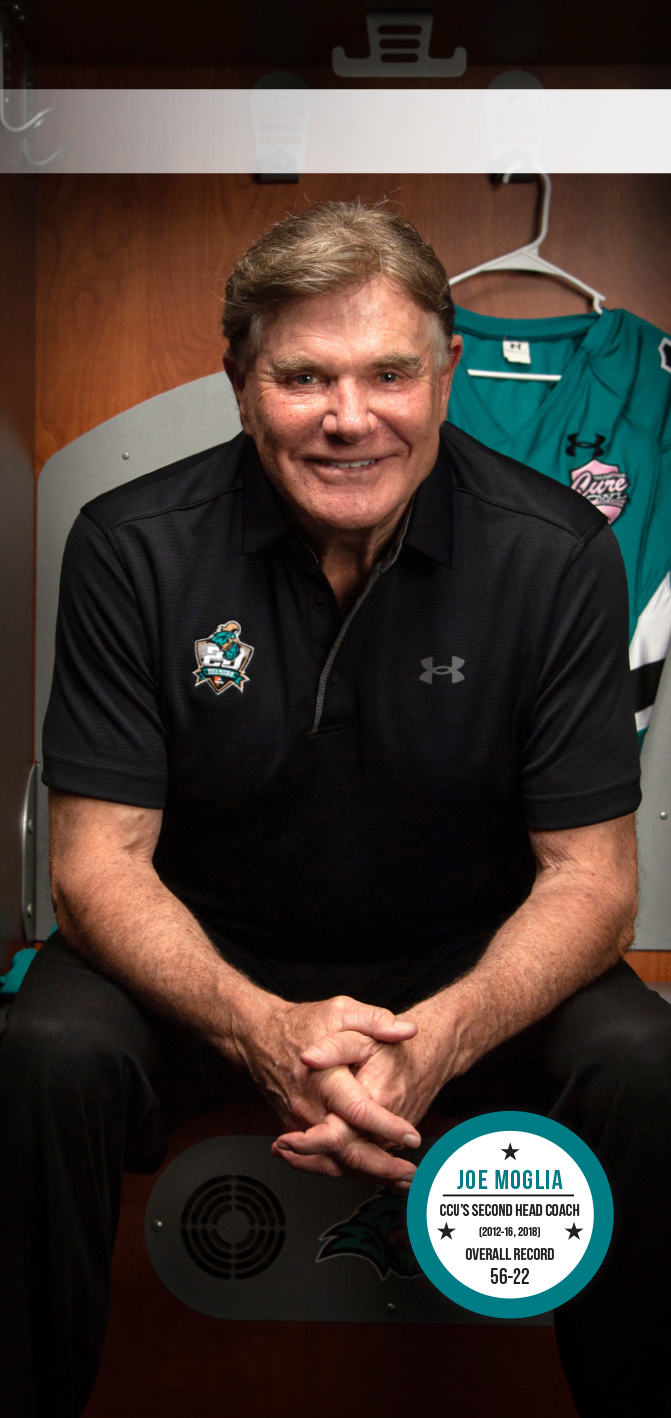
The Transition
Following Bennett’s dismissal, then-President David A. DeCenzo (who served from 2007-2020) handed over the reins of the program to Joe Moglia on Dec. 20, 2011. The move caught some by surprise, as Moglia was more known for his business acumen and his extraordinary corporate career than his collegiate football coaching experience.
“It was a risky decision, a tough decision, but a leader must, at times, make a risky decision to move a program forward,” DeCenzo said, in reference to the coaching leadership change.
Moglia arrived at CCU following a one-year stint as the head coach of the United Football League’s Omaha Nighthawks. From 2009-2010, he served as the executive advisor to the head football coach at the University of Nebraska in preparation for returning to the profession and achieving his original lifelong pursuit of being a collegiate head football coach.
When Moglia became the Chanticleers’ head coach, he also was the board chairman at TD Ameritrade, where he previously served as CEO for seven years (2001-08). Under his leadership, the company had a 500% return on investment, and the firm’s market cap increased from $700 million to $10 billion. Prior to joining TD Ameritrade, he spent 17 years (1984-2001) working with Merrill Lynch.
Before making a name for himself in the business world, Moglia spent 16 years as a football coach, including stops at Dartmouth and Lafayette and in the high school ranks, where he drew the attention of major programs and even turned down Power 5 (Atlantic Coast, Big Ten, Big 12, Pac-12, and Southeastern conferences) coordinator positions.
Without question, Moglia brought a distinctive approach to coaching that differentiated Chanticleer football. His program was the only one in the country that had no rules, just one standard. He called it BAM – Be a Man. His student-athletes were expected to: stand on their own two feet; take responsibility for themselves; treat others with dignity and respect; and live with the consequences of their actions. It was the philosophy upon which his entire program was built.

During Coach Moglia’s tenure, he led the program’s transition to the Sun Belt Conference and the Football Bowl Subdivision.
Moglia also introduced a student-athlete development series titled “Life After Football,” where he would devote 30 minutes of practice time each week to discuss topics other than football, such as mental health, leadership skills, and the role of democracy.
One of the program’s best-ever running backs played during Moglia’s BAM-era. De’Angelo Henderson ’15 was a two-time finalist for the Walter Payton FCS Offensive Player of the Year award. The recreation and sport management graduate also set an NCAA Division I record by scoring at least one touchdown in 35 consecutive games during his final three seasons.
“The uniqueness of our one-of-a-kind story, our vibrant and firm colors, our championship mentality, our knowledgeable and witty mascot, and the Chanticleer experience itself is what separates us from every school in the country,” said Henderson, who was drafted by the Denver Broncos in the sixth round of the 2017 NFL Draft. “The joy that you receive by being a part of the Chanticleer community, the underdog worldly view that is given from the outsiders, and all that is taught to propel you for post-college/football, is what I take pride in and what makes Chanticleer football unique.
“Chanticleer football has provided several opportunities for me and has impacted my life tremendously. The BAM concept is something that I still live by. The Life After Football talks that we had every week during my playing days were critical to our development as young men, becoming men, and I still implement many of those talks into my life now as well.”

(Top photo) The Chanticleers celebrate winning the 2014 Big South Conference championship.
In 2016, Moglia took the Life After Football concept one step further.
“We were the only program in the history of college football where the entire team voted for the president of the United States,” said Moglia. “That’s an incredible fact. We got a lot of recognition about that. We did things that no other program did.
“Our goal was to put a team on the field that Coastal Carolina would be proud of. That includes the student body, faculty, staff, alumni, and the greater community of Horry County. We certainly did a good job of winning, certainly won our share of championships, and certainly won our share of games in the playoffs. The winning was important, but it also meant we had to have students graduate. Under our watch, we had 48 guys doing graduate work while they were playing. No other program in the United States can say that. Our players did well on the field, but also represented our institution with regard to graduate studies. I believe we delivered on that mission.”
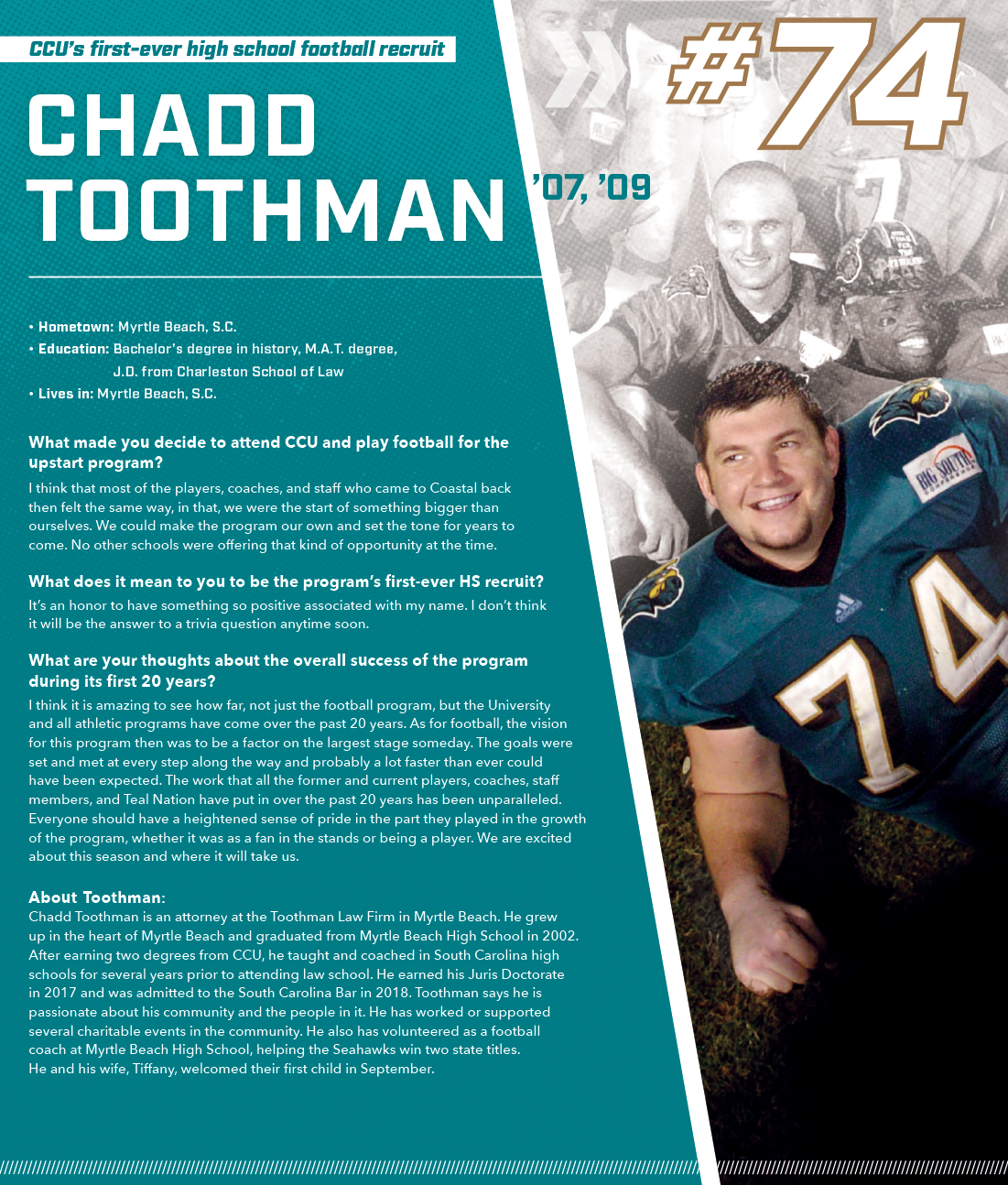
DeCenzo’s decision to hire Moglia proved to be highly successful for the University. During his tenure from 2012-16 and 2018, Moglia recorded an overall record of 56-22 (.718%). In 2017, he took a medical sabbatical. His teams won five conference titles and were consistently in the national playoffs. His best year was in 2014, when the Chants opened the season with 11 consecutive wins, ascended to No. 1 in the national polls, advanced to the FCS quarterfinals, and finished 12-2 overall. Moglia was a five-time national coach of the year finalist and the recipient of the 2015 Eddie Robinson FCS National Coach of the Year Award. He is a 2017 inductee into the Vince Lombardi Hall of Fame and a recipient of the Vince Lombardi Hall of Fame Award.
“There was something special about Joe Moglia,” said DeCenzo. “He had a unique background. He was successful in whatever he did – in coaching years ago and in business. His passion for coaching and understanding of the game was unmeasurable. What he accomplished, I believe, shows he was the right person at the time to lead CCU football.”
During Moglia’s tenure, DeCenzo said CCU was ready to move up to the FBS level, but it was only a question of whether the University would be asked to join a conference. On July 1, 2016, the Chanticleers left the Big South and joined the Sun Belt Conference. Moglia is credited with helping make that transition possible.
“In making the move to the Sun Belt Conference, we put CCU in a unique position,” said DeCenzo. “Being the third FBS program in the state, the Sun Belt Conference opened doors for the University in many ways. Most notably, the media coverage of our University and our athletic programs. I am absolutely convinced that exceling at this highest level of Division I sports has helped make the University a better-known institution. The move to FBS has provided more marketing coverage for the University than we could have ever hoped to get, let alone afford.”

The Handoff
During Moglia’s year-long sabbatical, Jamey Chadwell, newly hired as the program’s offensive coordinator, was named interim head coach. Hired away from Charleston Southern University, where he coached the Buccaneers for four highly successful years, Chadwell led CCU during its first year in the FBS.
“I came to Coastal for the opportunity to work with Coach Moglia,” said Chadwell. “He was a big reason, because of the way he ran things and his communication skills. I wanted to be a part of that and learn from him. And the opportunity to go FBS and be on the ground floor, that happens very rarely. To be a part of the build excited me. When you are building a house, the foundation is the most important piece. To be a part of that foundation was very exciting.”
Various player injuries during the 2017 season forced Chadwell to play four different quarterbacks, and the Chanticleers’ offensive line was the youngest in the nation as it featured two true freshmen, two redshirt freshmen, and a sophomore. The Chants endured a nine-game losing streak, but finished at 3-9 following a two-game win streak to close the season. The season was brightened, though, from winning the season opener against UMass, the program’s first win at the FBS level, and the first Sun Belt Conference win, coming in the unlikely location of Moscow, Idaho – a 13-7 victory versus the University of Idaho.
“I tell people it’s like being a substitute teacher,” Chadwell said, regarding his interim title. “The real one is coming back. So, it was challenging from that standpoint, because of what the title meant. Being our first year, there were a lot of challenges we went through in making that move and realizing how big of a jump it was from FCS to FBS. What you learn through the process is that the players are going to be resilient. They knew it was a challenge. They showed some resiliency as you’re trying to build the program. Working through that with the administration, they were rock solid on their commitment to making it work at FBS. That’s why we are where we are right now.”


(Top photo) Coach Chadwell, the 2020 national coach of the year, has led the Chanticleers to consecutive 11-win seasons in 2020 and 2021.
On Dec. 5, 2020, the Chanticleers hosted ESPN’s iconic College GameDay in the morning and then upset No. 8 BYU that evening by a score of 22-17.
Chadwell was promoted to head coach after Moglia announced his retirement from coaching on Jan. 18, 2019. Moglia now serves the University as chair of athletics and executive advisor to President Benson. In 2021, he made one of the largest-ever donations to CCU, which will support a new indoor practice facility, a proposed Brooks Stadium south endzone project, and a new stadium for the men’s and women’s soccer programs.
During Chadwell’s first year as the Chants’ full-time head coach in 2019, his team was 5-7 overall, including a 12-7 signature victory at Kansas, the program’s first-ever win versus a Power 5 opponent.
Then, in 2020, Chanticleer football burst onto the national scene. A highwater event that season took place on Dec. 5, when ESPN’s coveted College GameDay show was broadcast live from Brooks Stadium. That evening, the spotlight grew even brighter for the program and the University as the nation watched No. 14 CCU upset No. 8 BYU, 22-17. The thrilling game featured one of the country’s most memorable plays of the season, as safety Mateo Sudipo tackled a BYU wide receiver inside the Chants’ five-yard line during the final seconds of the Top 15 matchup to secure the historic win. The staging of the game itself garnered significant national attention since the matchup was conceived less than a week before kickoff after the regularly scheduled game with Liberty was canceled due to COVID-19 protocols with the Liberty program. In recognition of his team’s unexpected breakout season, Chadwell was named the 2020 national coach of the year by numerous outlets, including the Associated Press, Sporting News, Walter Camp, Eddie Robinson, and The Home Depot.
“GameDay doesn’t happen very often, anywhere, let alone at a G5 [Group of 5 conferences: American Athletic, Conference USA, Mid-American, Mountain West, and the Sun Belt] university in the Sun Belt,” said Chadwell. “We’re the first-ever program to host it from a Sun Belt standpoint. The notoriety that it bought to our program, having College GameDay on our campus, I don’t even know if you can put a price tag on that. It also established our program. We were the up-and-coming program, a good story. The BYU game established our brand and what the Chanticleer means. I think that it established it nationally. To have GameDay, go out and play on national TV, and beat a Top 10 team, that really brought the brand recognition that it now has, nationally, for the sport of football. That would not have happened without the GameDay experience and that game.”

Coach Chadwell has led the Chanticleers to consecutive bowl games, including a win at the 2021 Cure Bowl. Grayson McCall (bottom left) was named the Sun Belt Conference Player of the Year in both 2020 and 2021.
On Sept. 3, 2022, the Chanticleers opened their 20th year of competition with a 38-28 win versus Army. A Brooks Stadium record-setting crowd of 21,165 watched CCU notch the program’s 150th victory.
The Chants won all 11 regular season contests in 2020 and participated in the program’s first-ever bowl game – the FBC Mortgage Cure Bowl in Orlando, Fla.
A key member that year was defensive end Tarron Jackson ’20, who earned a bachelor’s degree in applied mathematics. He was named the 2020 Sun Belt Conference Defensive Player of the Year and finished as CCU’s all-time leader in career sacks (26.5) and tackles for loss (44.5). The Philadelphia Eagles drafted him in the sixth round of the 2020 NFL Draft.
“Coastal football means family to me,” said Jackson, who was not heavily recruited out of Silver Bluff High School in Aiken, S.C. “They took a chance on me when no other school believed I had the talent. They helped me grow as a student and as an athlete, which helped put me into a position to live out my dreams.”
The momentum of that season carried over into 2021, as CCU put together another 11-win campaign. Chadwell’s team capped the season with a 47-41 win versus Northern Illinois University in the Tailgreeter Cure Bowl. During the Chants’ first-ever bowl victory, the two teams combined for 1,030 total yards of offense in the high-scoring affair.
Following the season, 12 former Chanticleers received an opportunity to continue their playing careers professionally – a new program record. Three players were drafted while nine others were either signed as NFL free-agents or invited to mini-camps. The 2022 NFL draftees were Isaiah Likely, a fourth-round pick by the Baltimore Ravens, and Jeffrey Gunter, a seventh-round selection by the Cincinnati Bengals. Enock Makonzo was the No. 4 overall pick by the Edmonton Elks in the 2022 Canadian Football League Draft.
DeCenzo added: “It is very gratifying to see the tremendous success of the football program today. It ranks up there with the tremendous success of the University as a whole. Yes, athletic success is important and should be celebrated, but so, too, should academics be celebrated. Without the latter, the former is not possible.
“I’m so appreciative of the board of trustees for believing in and supporting this vision of CCU athletics. Without their support and encouragement, our success would not be possible.”
The 2020 and 2021 seasons, characterized by mullet-wearing players – starring recording-setting quarterback Grayson McCall, a two-time Sun Belt Conference Player of the Year – and unhinged post-game locker room celebrations, have been surreal for Chadwell. He recognizes the impact the national exposure has brought to his program and the University. But he’s quick to give credit to the program’s student-athletes – both former and current.
“There was the struggle, the climb to try to get to the mountaintop, so to speak,” said Chadwell. “Looking back at our bowl victory, I think a lot about the first team from 2002-2003. They signed on board not knowing what they were getting into. And 20 years later, to have a Top 25 program and the success we have had and think about all who came before us to help lay that foundation. Specifically, the players who have been a part of it the last few years, and overcoming the challenges to put this program in a position where we can compete for championships consistently. It makes me honored to be the coach during this timeframe, because I know what all the players have had to do to get to this point. And being such a short program – 20 years is nothing in the game of football. To see how far it has come is pretty special.”
Chadwell says he appreciates the alumni and community support and acknowledges that every time the Chants run onto the field, they’re representing CCU’s football alumni and the program they built. He said, “We are very appreciative to them and their commitment to Coastal football, and I hope they are proud of what we are doing.”
As for the future of teal and bronze football, Chadwell envisions even greater accomplishments.
“I hope we are consistently playing in these big games on national TV, and bringing GameDay back and all that stuff,” Chadwell said. “I hope we can continue that momentum. Our goal is to be the best G5 program in the country. We want to play in a New Year’s Six bowl [Cotton Bowl Classic, Fiesta Bowl, Orange Bowl, Peach Bowl, Rose Bowl, or Sugar Bowl]. That is what we’re working toward every year. We obviously want to win the Sun Belt, but, ultimately, we want to be the best in the country. That’s what our players are trying to fight for every day. It’s a big vision, but that’s what we are aiming for.”





